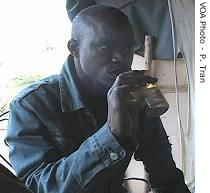-
(单词翻译:双击或拖选)
Dakar
09 April 2007
According to most poverty indicators1, almost half the population of Sub-Saharan Africa is living on less than $1 a day. One Senegalese food stand owner shows how far a dollar goes in this part of the world. Her aluminum-sided, cardboard-roofed sandwich and coffee stand in Dakar has become the community kitchen for hundreds of people, mostly men who come from far away to work in the city. For a little over one dollar, diners can afford breakfast, lunch, hot coffee, plus a helping2 of morning news. Phuong Tran has more from Dakar, Senegal.
Before the sun rises, Astou Diaw, 47, and her daughter, Yoni, ride a bus through Dakar's faintly-lit streets to get to her corner breakfast stand where she has sold bean filled baguettes and coffee for four years.
Before sandwiches, Diaw sold local juices, water and peanuts. But a breakfast stand seemed a better way to help support her family.
"I wanted to help out my husband and our seven kids," she said. "It is hard work and sometimes I cannot cover my costs. But even though it is really hard, I still am able to help out more than before."
A ten-minute bus ride later, Diaw arrives at her husband's metal shop, which is also the kitchen for her food stand.
Mother and daughter work quickly.
They heat a bucket of water, and stir3 beans over a fire that will go into her signature spicy4 lentil sandwich, a best selling 50 cent long baguette.
While Yoni washes glasses, Diaw fills a large silver bowl with the lentils. By seven thirty, she takes her seat for the morning rush.
 |
| Customer Mamadou Dieng |
He is a security5 guard who leaves his house before sunrise every day to travel 30 kilometers to Dakar.
"I come when I have the money. Sometimes, when I do not have money, I will still come by and she will sell me on credit," he said. "Here I can eat good home cooked food. Women like her help us out a lot. We do not have much money. At Astou's stand, for less than 50 cents, you can be full."
A group of men debate the recent presidential elections6 in Senegal.
Four hours and dozens of customers later, Diaw counts her change. She is short of the six dollars needed to cover her expenses on bread, butter, coffee and beans.
"Mondays are the hardest because most people do not have money yet to pay at the beginning of the work week," she said. "Maybe tomorrow will be better."
Folding her apron7, Diaw takes a lentil sandwich with mayonnaise. Leaving her daughter to work the lunch shift8, Diaw leaves and waits for the bus to go home.
Despite her cash problem on most Mondays, Diaw was able to make $2,000 last year from her food stand.
This is in a country where about half the population is unemployed9, and for those who work, their average annual salary is about $700.
 收听单词发音
收听单词发音
1
indicators

|
|
| (仪器上显示温度、压力、耗油量等的)指针( indicator的名词复数 ); 指示物; (车辆上的)转弯指示灯; 指示信号 | |
参考例句: |
|
|
|
2
helping

|
|
| n.食物的一份&adj.帮助人的,辅助的 | |
参考例句: |
|
|
|
3
stir

|
|
| n.感动(激动,愤怒或震动),搅拌,骚乱;vt.激起,惹起,搅和;vi.挪动,活动,离开,搅拌,激动 | |
参考例句: |
|
|
|
4
spicy

|
|
| adj.加香料的;辛辣的,有风味的 | |
参考例句: |
|
|
|
5
security

|
|
| n.安全,安全感;防护措施;保证(金),抵押(品);债券,证券 | |
参考例句: |
|
|
|
6
elections

|
|
| n.选举,当选,推举( election的名词复数 ) | |
参考例句: |
|
|
|
7
apron

|
|
| n.围裙;工作裙 | |
参考例句: |
|
|
|
8
shift

|
|
| n.交换,变化,移动,接班者;vt.更替,移转,变声;vi.改变,定责,更衣 | |
参考例句: |
|
|
|
9
unemployed

|
|
| adj.失业的,没有工作的;未动用的,闲置的 | |
参考例句: |
|
|
|















